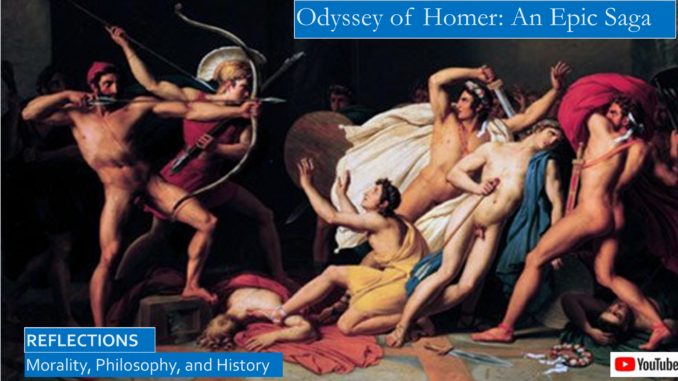
These stories of Odysseus’ travels enthrall the Phaeacians, and they agree to sail their guest home loaded with a treasure chest of gift, a treasure more abundant than that which he originally sailed from Troy and lost many years ago.
That night, on board, utterly exhausted, Odysseus sleeps deeply. Near morning, they land in a cove in a grotto on Ithaca, gently lifting the sleeping Odysseus onto shore, and nearby they place his chest, and quietly depart. When he awakes Odysseus is not sure where he is.
Odyssey Blog 1 http://www.seekingvirtueandwisdom.com/odyssey-blog-1-waiting-those-very-long-years-for-odysseus/
The YouTube video for the Odyssey is: https://youtu.be/bUW4ZT9zpt8
The YouTube script includes more book links: https://www.slideshare.net/BruceStrom1/odyssey-by-homer-adventures-of-odysseus
Professor Vandiver comments on the bittersweet nature of his return. When we return to our family from a long cruise we long to see our home approach over the horizon, watch the ship dock, and be joyously welcomed by our family on our return. Odysseus is denied all of this on his return.[1]
The goddess Athena appears to him in the disguise of a shepherd boy, and after conversing with the shepherd boy who tells him he is indeed in Ithaca, Odysseus launches into one of his incredibly complex tall tales as he manufactures his identity and his journey from Troy and how he got there.
“As he spoke, the goddess, clear-eyes Athena, smiled and patted him with her hand. Her form grew like a woman’s, fair and tall and skilled in fine work, and speaking in winged words she said, ‘Prudent and wily must one be to overreach you in craft of any kind, even though it be a god who strives to match you. Bold, shifty, and wily, will you not now within your own land cease from the false and misleading tales which from the bottom of your heart you love?’ “
They discuss how they will slaughter the hundred plus suitors. Athena assures Odysseus, “I will surely be with you; you shall never be forgotten when we begin the work. Some suitors will spatter the floor with their blood and their brains, these suitors who devour your living. But let me make you strange to all men’s view.” She disguises him as a beggar. “I will shrivel the fair flesh on your supple limbs, pluck from your head your yellow locks, and clothe you in rags that they who see shall loathe the wearer. And I will cloud your eyes, so beautiful before that you may seem repulsive to all the suitors there, and even to your wife and the son you left at home. But now seek out the swineherd, the keeper of your swine; for he is loyal, loving your son and steadfast Penelope,” your wife even after these many years. Athena announces she will summon Telemachus home from his stay in Sparta, bidding him to avoid the main harbor where the black ship lies in ambush, but rather to beach his ship nearby, and meet his father in the hut of the swineherd.
Not only will they slaughter the hundred plus suitors, they will also hang the disloyal servant girls who are the mistresses of the suitors, the suitors who also court Penelope. The perceived brutality may be unsettling to some modern readers, but we are hypocritical if we concern ourselves with the body count in the Odyssey while disregarding the man villains cleanly shot down in a Clint Eastwood western.
The ancient world was before the modern world, the ancients had no concept of a state that would arrest and try and imprison wrongdoers, if someone wronged you, you had no choice but to punish the wrongdoer yourself, and that meant either you would accept monetary compensation or a gift, or you would either maim or execute them, for there were no prisons. The suitors were plotting to kill the prince, surely if they were allowed to live they would one day kill the king, and the guilty slave girls could never be trusted in a dark house when everyone else was sleeping.
THE SWINEHERD GREETS ODYSSEUS AND TELEMACHUS
We get a rare glimpse into the lives of the slaves, the lives spent serving their masters, when Odysseus, disguised as a beggar, approaches the hovel of his swineherd Eumaeus, who chases away the dogs who snap at the stranger, offering hospitality to even an old beggar. “Old man, my dogs had nearly torn you to pieces here, all of a sudden, and so you would have brought reproach upon me. Ah well! The gods have given me other griefs and sorrows; for over my matchless master I sit and sign and groan, and tend fat hogs for other men to eat; while my master, hungry, wanders among lands and men who speak alien tongues, if he still lives and feels the sunshine. But follow me, old man, into the lodge, so that when you have eaten and drunk your fill, you may tell me where you come from and what troubles you have borne.” The good swineherd is more concerned about the beggar’s troubles than who he is.
They trade stories, Eumaeus tells Odysseus of his leaving for Troy and Penelope’s struggle with her suitors, and Odysseus tells his story as a rich man’s son in Crete who sailed to Egypt to “pillage the fair fields of the Egyptians, carrying off their wives and infant children and slaughtering the men.” After many manufactured adventures Odysseus lost his men and his ship, and even heard of Odysseus in the story, and was sold into slavery, escaped, and wandered to Ithaca.
The swineherd told his story, his father was a king of an island near Syria, but he was tricked and sold into slavery, and was purchased by Laertes, father of Odysseus. We remember a similar story how Joseph’s brothers sold him into slavery, this was a fate that awaited both poor and rich in the ancient world.
Athena had gone to Sparta to urge Telemachus home, not by way of the main harbor where the suitors were waiting in ambush, but to the same shore as Odysseus. The first words Odysseus heard from his son Telemachus were those words mixed with tears he spoke to the swineherd Eumaeus, “So be it, father! It’s for your sake I am here, to see you with my eyes, and hear you tell if my mother still is staying at the hall, or if at last some stranger won her, and so Odysseus’ bed, empty of occupants, stands covered with foul cobwebs.”
Athena had told Odysseus to keep in his disguise until she determined it was safe to reveal himself. So now the first words he hears his long-lost son say are when he calls the swineherd his father, how hard it was for Odysseus to control himself.
Soon Athena comes also in disguise, restores to Odysseus his robes and bulk and bloom, rounding his cheeks, darkening his beard, heightening his majesty. Telemachus is frightened, but Odysseus comforts him, “I am no god. Why do you liken me to the immortals? I am your father, him for whom you sighed and suffered long, enduring outrage at the hands of men.” Professor Vandiver notes that alone among his family Odysseus can offer no proof of his identity to Telemachus, no tell-tale childhood scars, but Telemachus accepts quicker than anyone else. Odysseus asks him how many suitors they need to face, when he learns there are over a hundred foes, Odysseus says between the two of them and a few loyal servants and Athena they should be able to prevail. Telemachus says okay.
You need to read the Odyssey yourself for many of the smaller stories, Telemachus returns to the palace, “round him flocked the haughty suitors, kind in their talk but in their hearts brooding on evil.” A few hours later the swineherd arrives, then the disguised beggar Odysseus arrives to beg at the palace.
When Odysseus first enters his palace yard, “a dog lying near lifted his head and ears,” This was Argos, only a puppy when Odysseus left for war. “In times past young men would take him on the chase for wild goats, deer, and hares; but now he lay neglected, his master gone away, upon a pile of dung which had been dropped before the door by mules and oxen, and when lay there is a heap for slaves to carry off and fertilize the broad lands of Odysseus. Here lay the dog, this Argos, full of fleas. Yet even now, seeing Odysseus near, he wagged his tail and dropped both ears, but toward his master he had not strength to move.”
Odysseus wipes away a tear but cannot pet his dog or even show that this dog may be special, he doesn’t even approach him. Professor Vandiver observes that the aging dog with fleas lying neglected on the dung heap represents how the estate of Odysseus has decayed in his absence. “Argos fell the doom of darksome death when he beheld Odysseus, twenty years away.”
Here the novel tells us of the abuse Odysseus as the beggar suffered abuse from the suitors, serving women, and even other beggars, and how Telemachus had to threaten a suitor with violence when he threw a stool at the beggar. Odysseus bides his time, gathering crusts to eat from the suitors, revealing himself to a few trusted servants to increase his odds, spending the day enduring the taunts of all the evil suitors and evil servants.
That night he stays behind when all the suitors retire to their own homes. He instructs Telemachus to put all the weapons on the wall of the palace in storage. Penelope asks Eurycleia, wet-nurse to young Odysseys, to wash his feet. She drops his leg and spills the basin when she sees his scar and realizes who he is, he has to warn her not to blow his cover. After sine time, his wife Penelope asks the beggar if he has heard of the fate of Odysseus. Of course, the beggar has heard of Odysseus’ fate, and he spins another long version of the tale of how he is from Crete and he has seen Odysseus many years ago, telling many tales of the strivings of Odysseus, and how he had a strange dream that revealed to him that Odysseus would arrive at the palace and slaughter the suitors.
Penelope announces, “I shall propose a contest with the axes which when at home Odysseys use to set in line, like trestles, twelve in all; then he would stand a great way off and send an arrow through. This contest I shall now propose to all the suitors. And whoever with his hands shall lightliest bend the bow and shoot through all twelve axes, him I will follow and forsake this home, this bridal home, so very beautiful and full of wealth, a place I shall ever remember even in my dreams.”
The beggar Odysseus answers, “O honored wife of Laertes’ son, Odysseus, delay no longer this contest at the hall; for wise Odysseus will be here before the suitors, handling the polished bow, can stretch the string and shoot through the iron.”
Clearly Penelope has seen through his disguise and overheard the gasps of her favored servant Eurycleia, but Professor Vandiver relates that many scholars debate whether Penelope really knows the beggar is really Odysseus, so skillfully has the bard woven in clues that suggest the contrary.[2]
Odyssey Blog 4 http://www.seekingvirtueandwisdom.com/odyssey-blog-4-the-slaughter-of-the-suitors/
[1] Elizabeth Vandiver, “The Odyssey of Homer,” lectures recorded by The Great Courses, (www.thegreatcourses.com, 1999), lecture 7.
[2] Homer, “The Odyssey,” translated by George Herbert Palmer (New York: Barnes and Noble Classics, 2003), Books XIII-XIX, pp. 158-248.

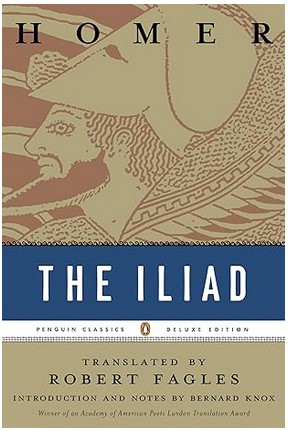




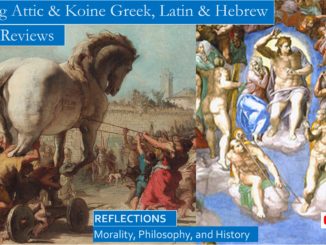
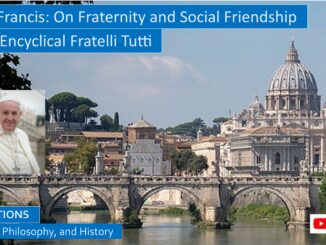
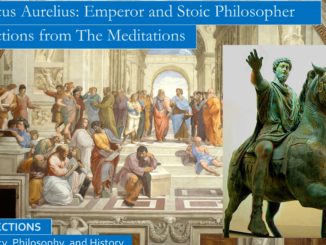
5 Trackbacks / Pingbacks